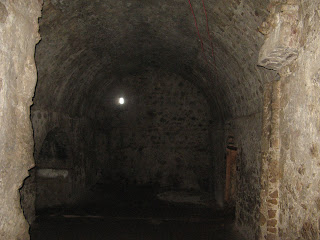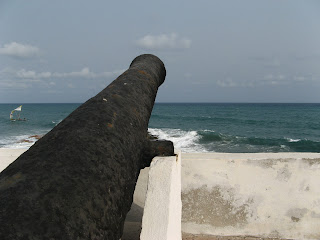Kakum National Park, Ghana
Oboroni. We hear it every day. It’s a common term among local dialects that means “white man” or “foreigner.” When little kids yell the word at us in the streets it sounds like this: “Brunie!” And if we fail to respond, they say, louder: “Brooonie!!!” Usually a turn and a smiling wave of the hand is enough to satisfy them. They wave back. We fascinate them.
But we white folks don’t fascinate each other, that’s for sure. And I didn’t get up extra early on a Saturday to come hang out in this rainforest with a bunch of oboroni.
In fairness, we were not the first tourists to arrive at Kakum National Park this morning. The park was open half an hour before we got here, so conceivably there could have been another tour ahead of us. There probably was. If they didn’t scare off the wildlife, this troop of 23 sweating palefaces that we’re forced to be part of, shuffling through the forest behind our African guide, will surely eliminate any chance of glimpsing the elephants.
The park administrators did this on purpose. We’re all the same, might as well group’em together, make the early birds wait for the latecomers, who cares, just make sure everybody pays. Price of admission includes the guided tour, if you’re planning to walk the rope-and-cable bridge system they’ve got rigged up in the trees, 30 metres above the forest floor — which we most definitely are.

I hate guided group tours. Everybody does, everywhere in the world, you can tell, you can smell it. Every individual group of tourists that’s forced to be part of the larger group harbours a secret resentment for all these other people who had the same idea. None of us came here to hang out with folks just like us.
Well, what cannot be cured… we’ll take up the rear, thanks, no please, you go ahead, all of you.
The guide turns out to be not totally useless, when we can hear him. He says Canadians built this elevated walkway, using US funds as well as bows and arrows. In 1994 the Canadians trained the locals to build platforms up in the canopy and then fire arrows from tree to tree to lay the groundwork, so to speak, for the network of bridges. A project built by Canadians, financed by Americans and maintained by Ghanaians. Interesting. I’d be more interested if he was talking to me, instead of the masses.

And then he is talking to me as I wait my turn step onto the wooden plank that forms the base of the first bridge. He asks me where I’m from, nods. “Yes, Canadians built this.” Then he gestures. Off you go.
Being on the walkway is pretty cool, like when Luke fought Vader on that catwalk in the Cloud City before losing his hand — except it’s all green and leafy around us, not the grey electronica of a pseudo space station. She rocks like a ship on rough seas, though, bouncing up and down when too many people walk on her at once.
We walk from tree to tree through the network, snapping photos and ogling the foliage underneath us, between us and the forest floor. But shuffle along, shuffle along, someone’s always coming up behind.

And then it’s over. We hit the last platform, built on a hillside level with the trees. The guide is taking the group deeper into the forest, but he wants more money first.
No thank-you, sir. I’d love to learn more about this rainforest, what it was made of before and after the British logged the hell out of the place during the two centuries that they kept their colonial headquarters in nearby Cape Coast.
But a forest hike with 20 other people of any nationality is not my idea of a forest hike. Next time we’ll get here even earlier, and hope for something a little more exclusive.















